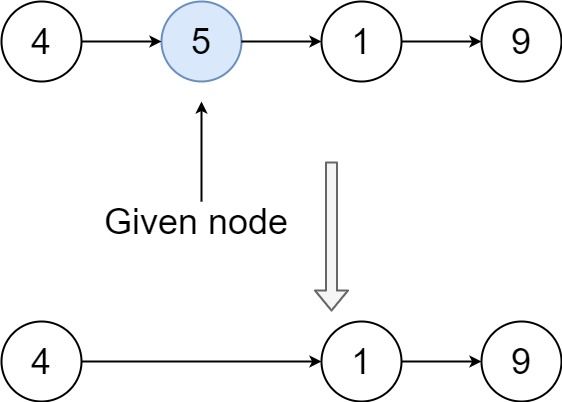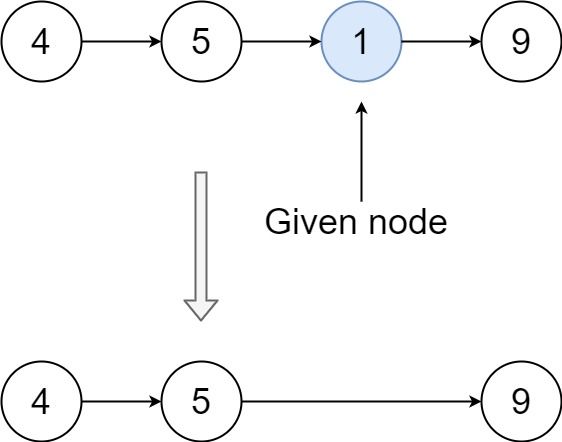| comments | difficulty | edit_url | tags | |
|---|---|---|---|---|
true |
Medium |
|
There is a singly-linked list head and we want to delete a node node in it.
You are given the node to be deleted node. You will not be given access to the first node of head.
All the values of the linked list are unique, and it is guaranteed that the given node node is not the last node in the linked list.
Delete the given node. Note that by deleting the node, we do not mean removing it from memory. We mean:
- The value of the given node should not exist in the linked list.
- The number of nodes in the linked list should decrease by one.
- All the values before
nodeshould be in the same order. - All the values after
nodeshould be in the same order.
Custom testing:
- For the input, you should provide the entire linked list
headand the node to be givennode.nodeshould not be the last node of the list and should be an actual node in the list. - We will build the linked list and pass the node to your function.
- The output will be the entire list after calling your function.
Example 1:
Input: head = [4,5,1,9], node = 5 Output: [4,1,9] Explanation: You are given the second node with value 5, the linked list should become 4 -> 1 -> 9 after calling your function.
Example 2:
Input: head = [4,5,1,9], node = 1 Output: [4,5,9] Explanation: You are given the third node with value 1, the linked list should become 4 -> 5 -> 9 after calling your function.
Constraints:
- The number of the nodes in the given list is in the range
[2, 1000]. -1000 <= Node.val <= 1000- The value of each node in the list is unique.
- The
nodeto be deleted is in the list and is not a tail node.
We can replace the value of the current node with the value of the next node, and then delete the next node. This can achieve the purpose of deleting the current node.
Time complexity
# Definition for singly-linked list.
# class ListNode:
# def __init__(self, x):
# self.val = x
# self.next = None
class Solution:
def deleteNode(self, node):
"""
:type node: ListNode
:rtype: void Do not return anything, modify node in-place instead.
"""
node.val = node.next.val
node.next = node.next.next/**
* Definition for singly-linked list.
* public class ListNode {
* int val;
* ListNode next;
* ListNode(int x) { val = x; }
* }
*/
class Solution {
public void deleteNode(ListNode node) {
node.val = node.next.val;
node.next = node.next.next;
}
}/**
* Definition for singly-linked list.
* struct ListNode {
* int val;
* ListNode *next;
* ListNode(int x) : val(x), next(NULL) {}
* };
*/
class Solution {
public:
void deleteNode(ListNode* node) {
node->val = node->next->val;
node->next = node->next->next;
}
};/**
* Definition for singly-linked list.
* type ListNode struct {
* Val int
* Next *ListNode
* }
*/
func deleteNode(node *ListNode) {
node.Val = node.Next.Val
node.Next = node.Next.Next
}/**
* Definition for singly-linked list.
* class ListNode {
* val: number
* next: ListNode | null
* constructor(val?: number, next?: ListNode | null) {
* this.val = (val===undefined ? 0 : val)
* this.next = (next===undefined ? null : next)
* }
* }
*/
/**
Do not return anything, modify it in-place instead.
*/
function deleteNode(node: ListNode | null): void {
node.val = node.next.val;
node.next = node.next.next;
}/**
* Definition for singly-linked list.
* function ListNode(val) {
* this.val = val;
* this.next = null;
* }
*/
/**
* @param {ListNode} node
* @return {void} Do not return anything, modify node in-place instead.
*/
var deleteNode = function (node) {
node.val = node.next.val;
node.next = node.next.next;
};/**
* Definition for singly-linked list.
* public class ListNode {
* public int val;
* public ListNode next;
* public ListNode(int x) { val = x; }
* }
*/
public class Solution {
public void DeleteNode(ListNode node) {
node.val = node.next.val;
node.next = node.next.next;
}
}/**
* Definition for singly-linked list.
* struct ListNode {
* int val;
* struct ListNode *next;
* };
*/
void deleteNode(struct ListNode* node) {
node->val = node->next->val;
node->next = node->next->next;
}
